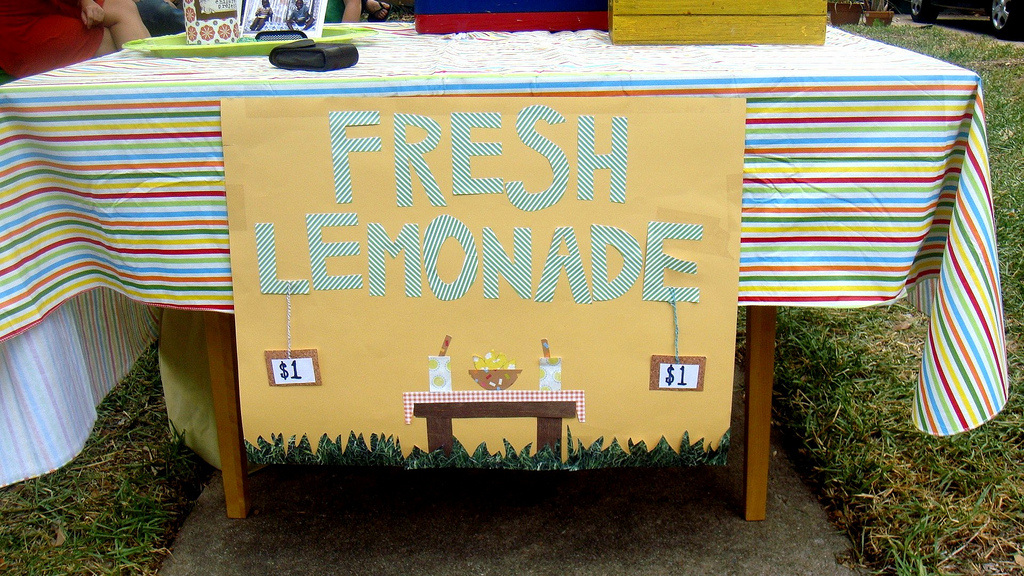| Sometimes, we don’t notice a problem until a celebrity becomes the victim. Last weekend, the young son of comedian Jerry Seinfeld and a few of his buddies decided to set up a lemonade stand along the road in their Hamptons neighborhood. They were raising money for a charity that helps needy families. |
| | Soon after, a neighbor called police, who came and shut down the operation. The kids didn’t have a business license or a permit to sell drinks. Headlines about licensing Nazis saying, “No more lemonade for you!” abounded. Seinfeld hammed it up in a photo with the kids on social media, their hands behind their heads as if they were being arrested. But really, the incident wasn’t funny. I thought of this recently as I noticed lemonade stands around the valley, their young proprietors learning hard lessons about the market. Luckily, common sense prevails over much of Utah when it comes to pre-adolescent entrepreneurism. Two years ago, Salt Lake County amended its ordinances to specifically exempt “lemonade stands and similar operations run by children” from licenses and permits. That isn’t the case in much of the country, and police aren’t shy about going after the young perps. Earlier this year, two little girls in Overton, Texas set up a stand so they could take their dad to Splash Kingdom on Fathers Day. Police showed up and told their mother they needed a permit from the city and the health department. After all, who knew if the kids had washed their hands? Writing for Forbes a couple of years ago, writer Erik Kain wondered why there seems to be a war on lemonade stands nationwide, citing several examples. But this isn’t just about lemonade stands. The war is much broader than that, and as Kain wrote, it often is “pushed by brick-and-mortar competitors who want to keep competition at a minimum.” Lemonade stands are so iconic in American culture they were the subject of a Norman Rockwell sketch in 1955. And speaking of the ‘50s, the Brooking Institution found that about 5 percent of Americans needed a government license to do their jobs back then. Today, about 30 percent do. The Institute for Justice publishes a list of the most licensed occupations nationwide, as well as one charting the greatest burdens, defined as the fees, exams and experience required to receive a license. Probably most of us agree it’s good to license certain occupations. You don’t want your heart surgeon winging it after watching some DIY video on Youtube. But most government licenses are for low-paying jobs that, at the least, shouldn’t require so much hassle to get into. Does an athletic trainer really need to pay $443 and have 1,460 days experience and training to do the job? If so, does it make sense that a pharmacy technician only has to pay an average of $67 and have 194 days training? And why are locksmiths licensed in only 13 states while earth drillers are licensed in 47? Good questions, all. Fortunately, even Democrats are starting to ask them. President Obama’s most recent proposed budget would have included money for states to look closely at their licensing rules and whether, according to a member of his Council of Economic Advisers, they “meet a cost-benefit test.” The White House went so far as to acknowledge that these restrictions cost millions of jobs as they limit competition deny opportunities to use skills. That was enough to make the Wall Street Journal editorial board cheer that, “Now we’re getting somewhere.” Here’s hoping. Utah made news awhile back when a woman challenged the state’s ridiculous requirements for a license to braid hair. She won, but just because you can braid hair and sell lemonade here without keeping someone on the lookout for the fuzz doesn’t mean all is well. The Institute for Justice ranked Utah 13th a few years ago for the burden it requires of the 46 occupations it licenses. Seinfeld’s children will be OK. There are many other low-income people with marketable skills who won’t be as lucky, however. This is one issue where the White House deserves support. |


 RSS Feed
RSS Feed

